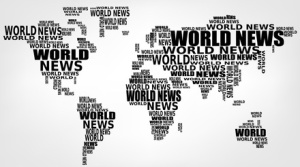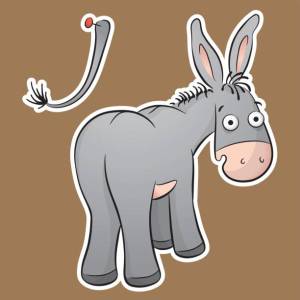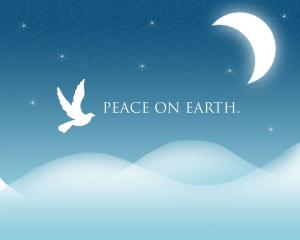For over 33 years, members of the organization to which I belong, the Armenian International Women’s Association (AIWA), have worked persistently on issues relating to women, children, and their families. Over the past 10 years I’ve had the opportunity to learn more about the challenges facing women globally through AIWA’s participation in the discussions of the UN CSW sessions. And as president of the organization it pains me to see that with all the resolutions, commitments and efforts made, gender-specific discrimination still abounds. I refer to the recent documentation by The Center For Truth and Justice with over 100 pages of proof of crimes against ethnic Armenians with gender specific brutality against women perpetrated by Azeri forces in Nagorno Karabakh. (Documentation was presented to the ICC April 18, 2024)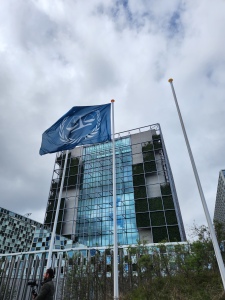
When a female Armenian soldier is captured, mutilated and disrobed, and the head of the Azeri republic awards the mutilator for a job well-done;
When an Armenian woman, mother of three children, captured in Jermuk, is raped, tortured and dismembered by Azeri soldiers and the image is downloaded 20 thousand times among Azeri’s with cheers;
When illustrations of Armenian female soldiers, their eyes gouged out, with fingers and legs cut off and fingers placed in their mouth and genitalia;
When a mentally disabled elderly Armenian woman is “tortured beyond recognition” by Azeri soldiers who sadistically hack off her ears, hands, and feet before finally executing her;
When the oldest, most silenced, and least-condemned crimes, crimes against women… rape, savage mutilation, dehumanization and slaughter … are used as instruments of armed conflict, I cannot remain silent. As an American, I am ashamed that we can play oblivious to these crimes, and as an Armenian, I have a responsibility to speak for women in the country of my ethnicity Armenia.
It is time for the world to hear that it is no longer acceptable to discuss women’s rights as separate from human rights. These abuses have continued because for too long the history of women has been a history of silence. Even today there are those who are trying to silence our words. But the voices of the women representing the injustices toward the women of Armenia and the men of Armenian must be heard loudly and clearly.
No civilian, no person, no soldier, no military force, or unit of any country has the right to commit such atrocities. It a gross violation not just of human rights, but a gross violation of the international humanitarian law.
Human rights, women’s rights, are universal in times of war and peace, in times of conflict or accord, so I urge the ambassadors (if they could hear me at The Hague yesterday) to ensure accountability for the women who have suffered dehumanization at the hands of the Azeris in Armenia; to ensure that today’s documentation of torture and conflict-related sexual violence translates into tomorrow’s prosecutions.
If impunity prevails, these horrific, atrocious acts of violence will continue to be normalized. I urge you to see this as beyond Artsakh. Because what happened in Artsakh sets a precedence for what is currently happening across the globe. Need I remind you of the most recent violations?… Russia and the Ukraine, Israel and Gaza. But, with Justice enforced, global norms of humanitarian law stand a chance. As a people who have experienced the toxic legacy of genocide of 1915, we have looked to a brighter future built on the secure knowledge of nations and organizations upholding the principles of universal humanity.
It is time for accountability. One cannot be impassive.
As the president of the Armenian International Women’s Association, I trust that the ICC has the capacity to bring about justice and restore some form of dignity to the families of the women and men who have brutally suffered at the hands of the Azeris. Dignity cannot be achieved unless all governments, here and around the world, accept their responsibility to protect and promote internationally recognized human rights, and criminally charge the perpetrator to the maximum extent of the law.
Azerbaijan must be accused of committing these war crimes.
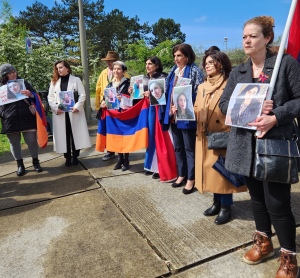 Yesterday, as I stood outside the ICC court house and saw Lala Abgaryan, sister of Gayane one of the mutilated soldiers, rise above her pain of brutal loss and the inhumanity suffered, I heard the remark “what courage she has!” Yes, she is courageous… as are the women of CFTJ presenting documents that incriminate Azeri leadership, and AIWA who soldier on to protect human rights, women’s rights, and try to make a dent in accountability and move the pendulum of justice to the right side of history. They are courageous, but the courage I really want to see is from leaders in a position to do something, whether they are Ambassadors, Heads of State, Member States here at the ICC, I want to see that courage, that courage of moral outrage for the torture and atrocities carried out by the Azeris on Armenian women or men, civilian or soldier. I want to see that courage, the kind that fuels the power of international law to seek justice.
Yesterday, as I stood outside the ICC court house and saw Lala Abgaryan, sister of Gayane one of the mutilated soldiers, rise above her pain of brutal loss and the inhumanity suffered, I heard the remark “what courage she has!” Yes, she is courageous… as are the women of CFTJ presenting documents that incriminate Azeri leadership, and AIWA who soldier on to protect human rights, women’s rights, and try to make a dent in accountability and move the pendulum of justice to the right side of history. They are courageous, but the courage I really want to see is from leaders in a position to do something, whether they are Ambassadors, Heads of State, Member States here at the ICC, I want to see that courage, that courage of moral outrage for the torture and atrocities carried out by the Azeris on Armenian women or men, civilian or soldier. I want to see that courage, the kind that fuels the power of international law to seek justice.
On behalf of a people who have suffered disproportionately through this continued dehumanizing attritive genocide, I request that the international community take action to punish Azerbaijan for the deliberate Armenophobic gender selective brutality and be accountable for the gross assault on human rights and violations of international human rights laws.
I demand accountability.
 Your strength, beauty and depth of love
Your strength, beauty and depth of love


